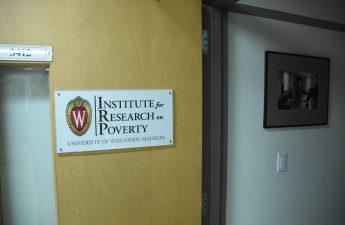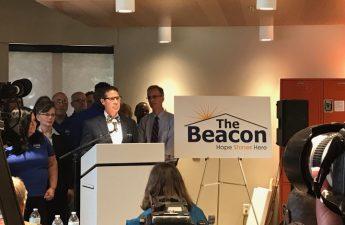How Has Poverty Had an Effect on Families in Winsconsin.
Despite pocket-sized percentile improvements, many Wisconsinites experience economic hardship and live in poverty, co-ordinate to a report released by the Coalition on Human Needs and 9 to 5 Wisconsin.
The written report, or the "Wisconsin Poverty Snapshot," measured poverty beyond the state. According to the written report, xi.3 percent of Wisconsinites lived in poverty in 2017, down .v percent from 2016.
But the report also stated that those numbers are "statistically unchanged," or that the percentile comeback is likewise minor to be significant or statistically meaningful.
The study additionally stated that about 638,000 people live in poverty in Wisconsin, and one.5 one thousand thousand people live virtually poverty.
In terms of the U.Due south., Wisconsin is ranked 33rd in terms of poverty. Deborah Weinstein, the executive director of the Coalition on Human being Needs, described this ranking.
"Wisconsin's poverty rate is lower than the national boilerplate," Weinstein said. "For 2017 … the U.S. poverty rate was thirteen.4 percent — Wisconsin'southward rate was 11.three percent, so better than the U.Southward. total. With lower poverty than the national average, you'd expect Wisconsin to evidence upwardly ranked with less poverty than many other states."
 UW joins Shepherd Higher Education Consortium of Poverty, supporting internships in poverty studies The University of Wisconsin announced Sept. 13 that it joined the Shepherd Higher Pedagogy Consortium on Poverty, a nonprofit cohort Read…
UW joins Shepherd Higher Education Consortium of Poverty, supporting internships in poverty studies The University of Wisconsin announced Sept. 13 that it joined the Shepherd Higher Pedagogy Consortium on Poverty, a nonprofit cohort Read…
A multitude of factors to contribute to poverty, including low education and opportunity, single-parent family construction, low-wage and part-time employment, barriers to employment, or a history of incarceration, Rebecca Schwei, a researcher at the Found for Research on Poverty at UW, said.
The Coalition on Human being Needs website links national organizations together to promote the rights and needs to vulnerable and low-income populations. They work with organizations that back up civil and religious rights, along with those that support the elderly, women, children and the disabled.
Weinstein added that the unemployment rates in the state of Wisconsin are lower than the national average. According to the Department of Labor Statistics , the annual average unemployment rate in the U.S. was 4.4 percent in 2017. Wisconsin, with a 3.3 percent unemployment rate, was ranked 10th out of all states.
Weinstein, however, cited a troubling trend in labor statistics.
"A key and troubling gene is race: across the nation and fifty-fifty more than and then in Wisconsin, people of color and Hispanics of whatever race are more likely to be poor," Weinstein said.
Weinstein added that Wisconsin has a college white population than the national average and that the white population has a lower rate of poverty than the residual of the U.Due south. But the opposite is true for people of color.
According to a report by the Henry J. Kaiser Family Foundation , the poverty charge per unit for white people is 8 percentage nationally. In the state of Wisconsin, that rate is six percent.
The written report also found that nationally, black people had a poverty rate of 20 per centum. In Wisconsin, that rate is 27 percent.
 As Wisconsin overhauls welfare programs, UW offers new anti-poverty solutions In light of Wisconsin Republicans trying to overhaul the state's welfare programs, Academy of Wisconsin faculty at the Found for Research Read…
As Wisconsin overhauls welfare programs, UW offers new anti-poverty solutions In light of Wisconsin Republicans trying to overhaul the state's welfare programs, Academy of Wisconsin faculty at the Found for Research Read…
According to the Snapshot, federal and state government programs worked to lift people out of poverty. The report statesd that Social Security lifted 27 million individuals out of poverty nationally in 2017. Additionally, Supplemental Security Income lifted iii.2 meg people out of poverty, as did the School Lunch Programme for one.2 million people.
In terms of helping those who are low-income, the report stated that ii.9 million fewer people were poor because of housing subsidies and 3.4 million fewer people were poor because of programs similar food stamps and others designed every bit food assistance.
People in poverty face a variety of bug, Weinstein noted — some of which have deeply worrisome effects.
"People in poverty are more probable to suffer ill-health, to exist unemployed or in unstable employment, to move frequently," Weinstein said. "Children who feel time in poverty are more than likely to suffer ill health, chronic wellness weather condition, developmental delays, fall behind in school, drop out of school, and earn less during their adult years."
According to the Snapshot, in Wisconsin, 26 pct of those who are working-age with incomes between half the poverty line and merely below the poverty line had employer-based insurance. 53.9 percent had Medicaid coverage.
The report also noted that, in Wisconsin, 58 pct of households earning less than $twenty,000 paid more than half of their income on hire in 2017. Ten percentage of Wisconsin households, between 2015 and 2017, experienced times when they could non beget food.
Weinstein also said those beyond the poverty line face economic issues as well.
"Many people well above the poverty line find it increasingly difficult to save, to buy homes, to go an education to a higher place loftier school (or help their children get one), or to be secure in retirement," Weinstein said.
 Homeless shelters over capacity due to cold conditions Madison's homeless shelters found themselves over capacity this week as temperatures accept continued to drib. Once the temperatures drop below Read…
Homeless shelters over capacity due to cold conditions Madison's homeless shelters found themselves over capacity this week as temperatures accept continued to drib. Once the temperatures drop below Read…
She added that, despite what some may believe, many people who are poor accept employment. She added that while some may non piece of work twelvemonth-round or full time, a lot of work can be unstable, low-paid, and offer minimal to no ill leave.
The Snapshot noted that President Donald Trump's administration's ongoing boxing with states regarding Medicare and Medicaid could result in rollbacks to healthcare that greatly impairment poverty-stricken populations. Similar measures to cut funding for nutrient assist could have harmful furnishings as well, the report adds.
"Efforts to deny health intendance or nutrient assistance will throw more people in poverty because they become sicker and tin't go treatment," Weinstein said.
Source: https://badgerherald.com/news/2019/02/05/economic-hardship-and-poverty-still-an-issue-in-wisconsin-report-shows/
0 Response to "How Has Poverty Had an Effect on Families in Winsconsin."
Publicar un comentario